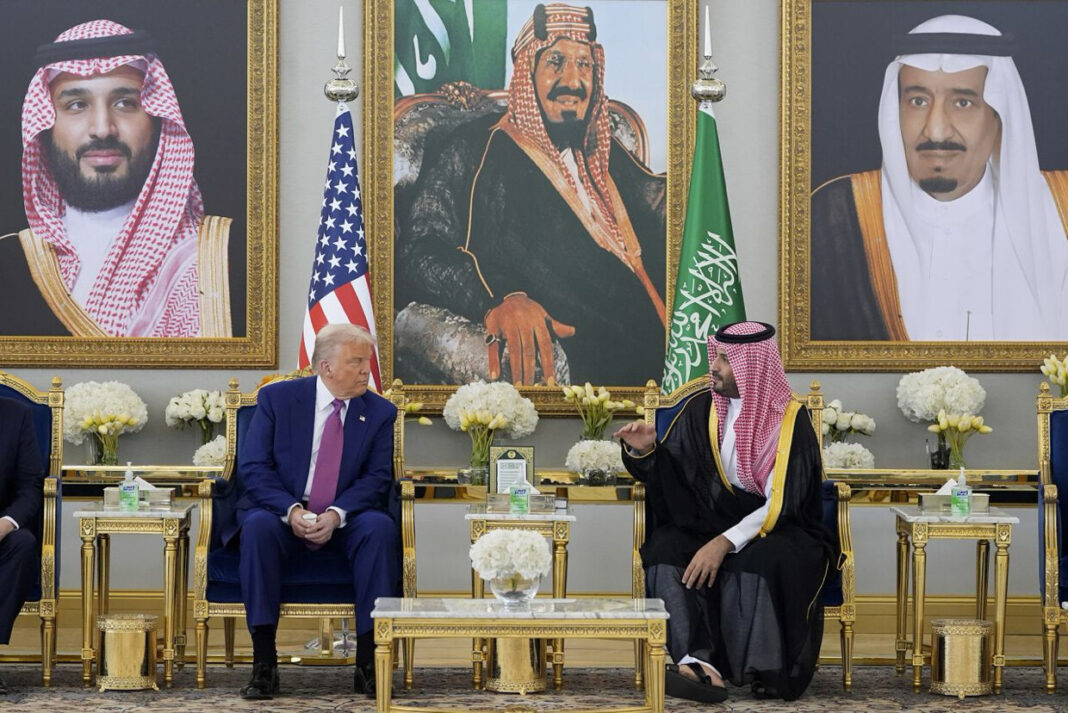Key Points:
- President Trump lands in Riyadh to begin four-day Gulf tour, greeted with royal ceremony.
- U.S.-Saudi forum expected to unlock $1 trillion in economic investment pledges.
- Civil nuclear deal discussed as Saudi Arabia seeks uranium enrichment capability.
- Critics raise ethical concerns over reported Qatari jet gift to Trump.
- Regional conflicts in Gaza and Iran nuclear threat remain in the background.
U.S. President Donald Trump received a lavish royal welcome today as he arrived in Riyadh, launching a high-stakes four-day tour of the Gulf aimed at deepening economic ties with key Middle Eastern allies.
Trump was welcomed at King Khalid International Airport by Crown Prince Mohammed bin Salman (MBS), with Saudi fighter jets escorting Air Force One in a symbolic gesture of alliance. The purple-carpet reception, traditionally reserved for the highest dignitaries, included performances of traditional Ardah dance and coffee ceremonies — underscoring the importance of this bilateral visit.
According to Al Arabiya, the Crown Prince personally greeted the U.S. delegation upon arrival, reflecting the warmth of Saudi-U.S. relations.
The two leaders immediately convened at the Royal Court for a business-focused luncheon with top U.S. corporate leaders, including Elon Musk, BlackRock CEO Larry Fink, and Citigroup’s Jane Fraser. According to The Washington Post, the guest list signals the trip’s deep commercial underpinnings.
Economic Agenda Takes Center Stage
The highlight of Trump’s stop in Riyadh is the Saudi-U.S. Investment Forum, which is expected to unveil more than $1 trillion in bilateral investment frameworks.
According to Reuters, Saudi Arabia has already committed over $600 billion toward joint ventures in infrastructure, defense, and renewable energy sectors as part of its Vision 2030 strategy to diversify beyond oil.
A notable development is the potential civil nuclear agreement under negotiation between the two governments. The deal, if finalized, would allow Saudi Arabia to enrich uranium under international safeguards — a sensitive arrangement long debated in nuclear nonproliferation circles.
As reported by Reuters, this approach reflects a recalibrated U.S. posture that delinks Saudi nuclear access from its normalization with Israel.
Geopolitics on the Sidelines
While economic ties dominate the agenda, pressing regional issues — including the ongoing Gaza conflict and tensions with Iran — have not been publicly addressed in detail. Trump’s itinerary does not include a stop in Israel, raising questions about the administration’s broader Middle East strategy.
According to AP News, U.S. officials insist that Iran’s nuclear activity and efforts to de-escalate the war in Gaza will be discussed privately during Trump’s meetings in Riyadh and Doha.
Despite criticism from humanitarian groups about the lack of direct engagement with the Gaza crisis, the Trump administration maintains its “peace through prosperity” doctrine — aiming to stabilize the region by prioritizing economic partnerships over military intervention.
Ethical Concerns Shadow Trip
A cloud of controversy surrounds reports that Qatar’s royal family has offered Trump a $400 million luxury Boeing jet as a gift — a plane some speculate could be designated as a future Air Force One equivalent.
According to PBS NewsHour, ethics experts warn the gesture could constitute a conflict of interest given Trump’s ongoing business ventures in the Gulf.
Though the former president has called the plane offer a “symbol of friendship,” critics argue that such a transfer raises constitutional and ethical concerns under the Emoluments Clause.
Outlook: A Strategic Pivot?
After concluding his Saudi stop, Trump is expected to travel to Qatar and the United Arab Emirates, where further economic and energy agreements are on the table.
According to The Guardian, his Gulf itinerary underscores the administration’s preference for economic diplomacy over military entanglement.
With a $1 trillion investment goal and complex geopolitical realities in play, the success of Trump’s Gulf mission will hinge on whether economic engagement can truly foster political stability — or whether underlying tensions will outpace investment-driven diplomacy.
Further updates are expected following Trump’s high-level meetings in Doha and Abu Dhabi. Virginia Times will continue monitoring developments, including updates on trade agreements, regional diplomacy, and reaction from allies and adversaries.
(This article is based on reporting and publicly available statements from Reuters, AP News, Washington Post, Al Arabiya, The Guardian, and PBS NewsHour)
A global media for the latest news, entertainment, music fashion, and more.














